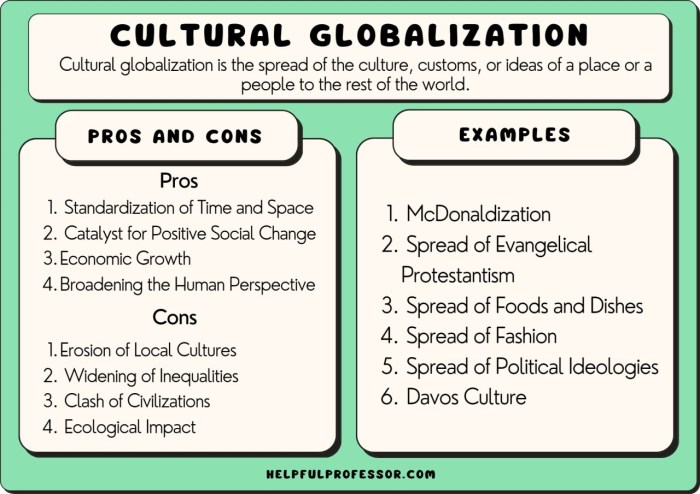This professor most likely believes globalization is a complex and multifaceted phenomenon that has profound economic, social, political, and environmental implications. Globalization has led to increased economic growth and prosperity in different regions of the world, but it has also had negative consequences, such as cultural homogenization and the loss of traditional practices.
Globalization has also affected the role of nation-states and international organizations. It has presented challenges and opportunities for global governance and cooperation. Additionally, globalization has had a significant impact on international security, including the spread of terrorism and the proliferation of weapons of mass destruction.
Economic Benefits of Globalization

Globalization has fostered increased economic growth and prosperity in various regions of the world. It facilitates the exchange of goods, services, and ideas, leading to enhanced productivity and innovation. International trade and investment have played a crucial role in promoting economic development and reducing poverty.
Increased Economic Growth, This professor most likely believes globalization is
- Globalization has expanded markets for businesses, enabling them to reach a wider customer base and increase their revenue.
- Access to foreign capital and technology has accelerated economic growth in developing countries.
- Free trade agreements have reduced tariffs and other barriers, boosting trade volumes and economic activity.
Enhanced Productivity and Innovation
- Globalization has facilitated the transfer of knowledge and technology across borders, fostering innovation and productivity gains.
- Multinational corporations have played a significant role in spreading best practices and cutting-edge technologies.
- Competition in global markets has driven businesses to innovate and improve their efficiency.
Economic Development and Poverty Reduction
- Globalization has integrated developing countries into the global economy, providing them with access to new markets and investment.
- Foreign direct investment has created jobs, boosted infrastructure, and stimulated economic growth in developing countries.
- International trade has helped reduce poverty by providing developing countries with the opportunity to export their goods and earn foreign exchange.
Social and Cultural Impacts of Globalization

Globalization has profoundly influenced the spread of ideas, cultures, and values across borders. It has brought positive aspects, such as increased cultural awareness and diversity, but also raised concerns about cultural homogenization and the loss of traditional practices.
Increased Cultural Awareness and Diversity
- Globalization has facilitated the exchange of cultural expressions, such as music, art, and literature, fostering a greater appreciation of diversity.
- Travel and tourism have allowed people to experience different cultures firsthand, promoting cross-cultural understanding.
- Social media and the internet have connected people from diverse backgrounds, creating virtual communities and sharing cultural perspectives.
Cultural Homogenization
- Globalization has led to the spread of Western culture and values, potentially overshadowing or marginalizing local traditions.
- Multinational corporations often promote their products and services in a way that reflects Western cultural norms.
- The dominance of English as a global language can lead to the loss of linguistic diversity.
Loss of Traditional Practices
- Globalization can disrupt traditional ways of life, as people adopt new technologies and lifestyles.
- Economic pressures and urbanization can lead to the abandonment of traditional crafts, languages, and customs.
- Globalization can erode the authority of local institutions and elders, who often play a central role in preserving cultural traditions.
Political and Security Implications of Globalization
Globalization has significantly affected the role of nation-states and international organizations. It has presented challenges and opportunities for global governance and cooperation, as well as impacting international security.
Role of Nation-States and International Organizations
- Globalization has eroded the sovereignty of nation-states in some areas, as international organizations play a greater role in global affairs.
- International organizations, such as the United Nations and the World Bank, have gained influence in areas such as peacemaking, economic development, and environmental protection.
- Globalization has fostered the creation of regional organizations, such as the European Union, which promote cooperation and integration among member states.
Challenges and Opportunities for Global Governance
- Globalization has made it more difficult to address global issues, such as climate change and terrorism, as they require international cooperation.
- Globalization has also created opportunities for cooperation, as countries recognize the need to work together to solve common problems.
- International organizations play a crucial role in facilitating global governance and cooperation, providing a platform for dialogue and negotiation.
Impact on International Security
- Globalization has increased the interconnectedness of the world, making it easier for people, goods, and ideas to move across borders.
- This interconnectedness has also facilitated the spread of terrorism and the proliferation of weapons of mass destruction.
- Globalization has also made it more difficult to control the flow of illicit goods, such as drugs and weapons.
Environmental Consequences of Globalization

Globalization has had a significant impact on the environment, both positive and negative. It has increased global trade and transportation, which has led to environmental challenges, but it has also raised awareness of environmental issues and promoted sustainable development.
Environmental Impact of Increased Global Trade and Transportation
- Globalization has led to increased consumption of goods, which has resulted in increased greenhouse gas emissions and pollution.
- Transportation of goods and people across long distances contributes to air and water pollution.
- Globalization has also led to the loss of biodiversity, as natural habitats are converted to agricultural land or for other purposes.
Role of Globalization in Sustainable Development
- Globalization has raised awareness of environmental issues and promoted the adoption of sustainable practices.
- International organizations and agreements have played a role in promoting environmental protection and conservation.
- Globalization has also facilitated the transfer of environmental technologies and knowledge, helping countries to adopt more sustainable practices.
Negative Environmental Consequences
- Globalization can lead to the exploitation of natural resources, resulting in deforestation, pollution, and loss of biodiversity.
- Increased consumption and production can lead to the depletion of non-renewable resources.
- Globalization can also contribute to climate change, as greenhouse gas emissions from transportation and industry increase.
Clarifying Questions: This Professor Most Likely Believes Globalization Is
What are the main economic benefits of globalization?
Globalization has led to increased economic growth and prosperity in different regions of the world. It has facilitated the exchange of goods, services, and ideas, leading to increased productivity and innovation. International trade and investment have also played a role in promoting economic development and reducing poverty.
What are the main social and cultural impacts of globalization?
Globalization has influenced the spread of ideas, cultures, and values across borders. It has led to increased cultural awareness and diversity. However, it has also raised concerns about cultural homogenization and the loss of traditional practices.
What are the main political and security implications of globalization?
Globalization has affected the role of nation-states and international organizations. It has presented challenges and opportunities for global governance and cooperation. Globalization has also had an impact on international security, including the spread of terrorism and the proliferation of weapons of mass destruction.
What are the main environmental consequences of globalization?
Globalization has had a significant impact on the environment. Increased global trade and transportation have led to increased pollution, deforestation, and biodiversity loss. However, globalization has also played a role in promoting sustainable development and mitigating climate change.